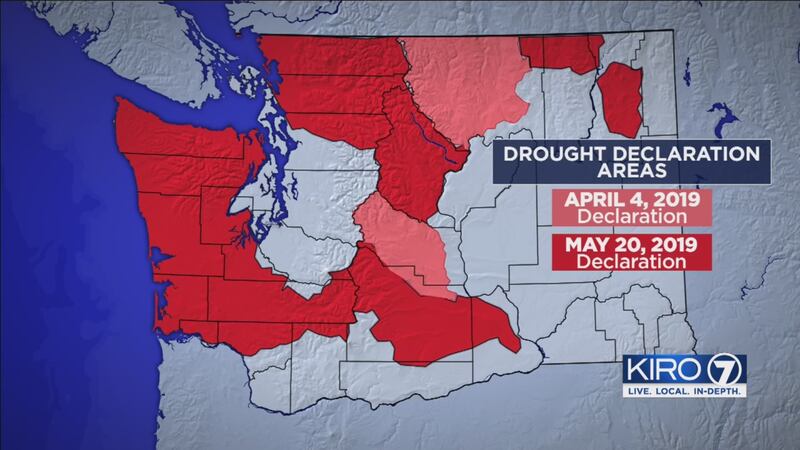When Chopper 7 headed toward the Cascades on Monday for video of the snowpack, our crew had to turn around because of bad weather.
But don't let the raindrops fool you.
"It doesn't seem very 'droughty' today but our water supply is dependent on a lot of long term conditions," said Jeff Marti, Drought Coordinator for the Washington Department of Ecology.
Scroll down to continue reading
More news from KIRO 7
- Man armed with knife shot and killed by Auburn police
- City of Seattle begins clearing large homeless encampment involved in drug-ring bust
- Man who lived alone with rats awarded $8 million
- Seismologists tracking series of tremors south of Seattle
- Do you have an investigative story tip? Send us an email at investigate@kiro7.com
This year, the long term conditions are grim.
Gov. Jay Inslee on Monday expanded the drought emergency from three to 27 watersheds, covering nearly half the state.
It comes in a year we've already seen early wildfires, with forecasts for a long fire season.
The summers of 2017 and 2018 saw wildfire smoke in the Puget Sound area, another sign of climate change.
"We've had a much drier than normal winter and our snowpack is actually pretty dismal for this time of year," Marti said.
State officials say among the last thirty years, 2019 is shaping up to have the fourth lowest snowpack and the sixth lowest level of mountain precipitation.
Precipitation levels on the Olympic Peninsula and in Southwest Washington are among the lowest in 50 years.
So, should you expect water restrictions this summer?
"Based on current conditions and forecasts, Seattle, Tacoma and Everett regional water systems have sufficient supply for both people and fish this summer," said Sabrina Register of Seattle Public Utilities.
Register also urged customers to continue to use water wisely.
SPU officials say because of the low snowpack, they began refilling mountain reservoirs earlier than normal this year.
The drought could have more of an impact on customers of smaller water systems.
"They don't have the storage, they don't have the backup systems, they don't have the redundancy and the resources," said Marti.
State officials do not expect this year's drought to be as bad as the 2015.
Read more about the state's drought response here.
Cox Media Group








